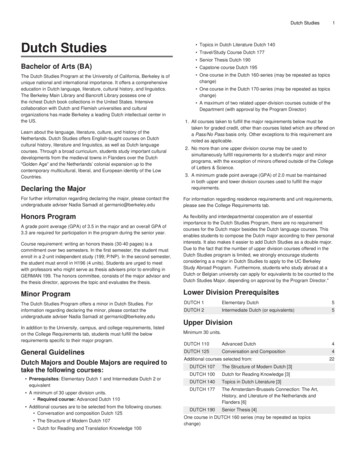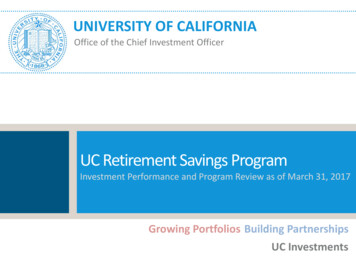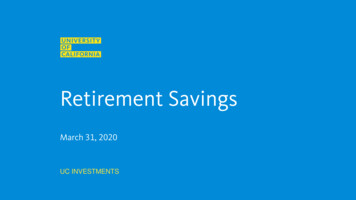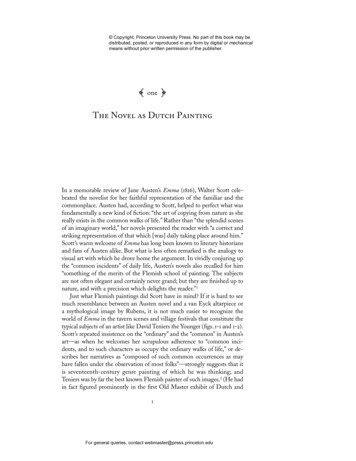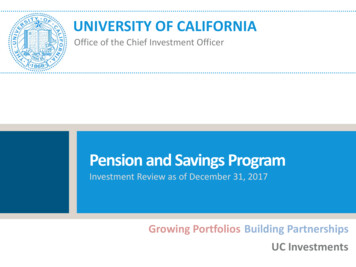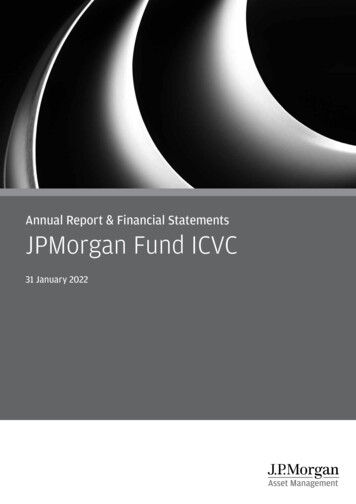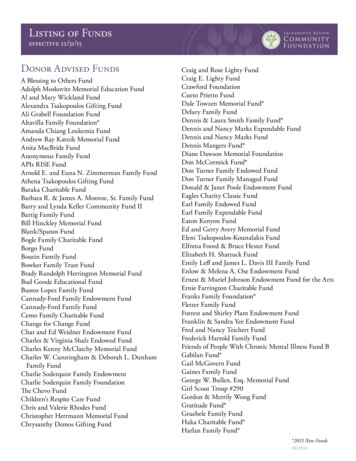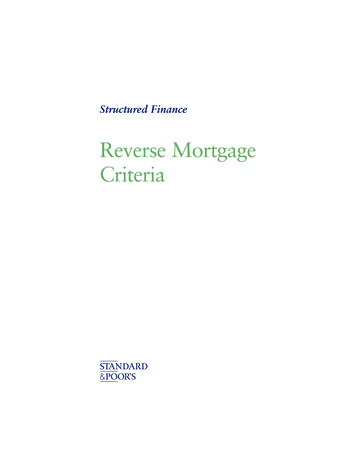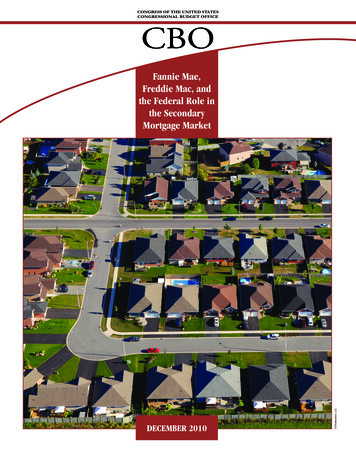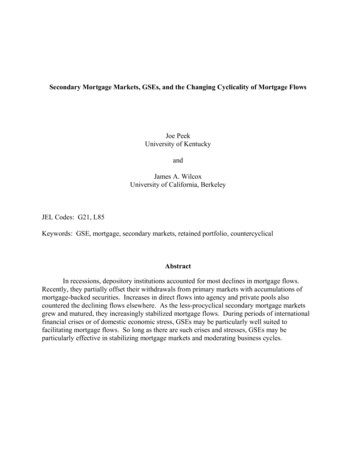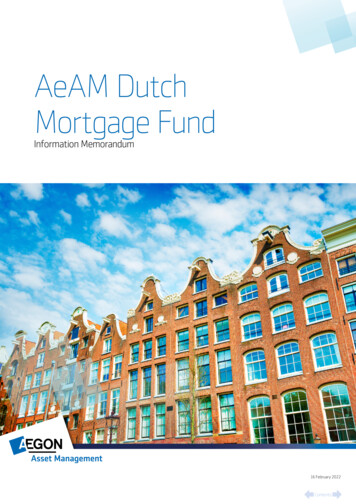
Transcription
AeAM DutchMortgage FundInformation Memorandum16 February 2022
ContentsAddresses 3Definitions 4Important information 61.Introduction 72.Description of the mortgage market 83.Target group of investors 104.Profile and investment policy of the Fund 115.Risk factors 136.Participation in the Funds 157.Profit distribution 208.Tax aspects 219.Valuation of the Fund 2210.Costs and fees 2311.Reporting and other information 2412.Meeting of Participants 2513. Manager, Title Holder, Depositary,mortgage provider and servicer 2614.Affiliated Parties 2915.Other information 3016.Responsible Investing and Active Ownership 31AppendicesIReturns II Terms and Conditions of Managementand Custody of the Fund IIIEntry Form IVSummary of key contracts with affiliated parties Fund specifications 3334474950
AddressesManagerTitle HolderAegon Investment Management B.V.Aegonplein 502591 TV The HagueAegon Custody B.V.Aegonplein 502591 TV The HagueAccountantPricewaterhouseCoopers Accountants N.V.Thomas R. Malthusstraat 51066 JR AmsterdamLegal advisorAllen & OveryApollolaan 151077 AB AmsterdamDepositaryCitibank Europe Plc, Netherlands branchSchiphol Boulevard 2571118 BH SchipholFor informationAegon Investment Management B.V.Aegonplein 502591 TV The Haguewww.aegon.nlThe Hague, 16 February 20223Contents
DefinitionsThe following terms, which are capitalised in this Information Memorandum, are defined as follows:Aegon: Aegon N.V. and all of its subsidiaries;Affiliated Party: a party affiliated with the Fund, the Manager or Title Holder, as referred to in Article 1 of the Bgfo;AFM: the Netherlands Authority for the Financial Markets;Benchmark: JP Morgan Government Bond Index Traded Netherlands;BGfo: the Dutch Market Conduct Supervision (Financial Institutions) Decree (Besluit Gedragstoezicht financiële ondernemingenWft), as amended from time to time;Call for Payment: a written request from the Manager to the Participants to pay (part of) the Outstanding Committed Amount;Capital Issue Date: the date, being at most fifteen business days after a Trading Day, on which the number of Participationsacquired by a Participant are entered into the register of Participants;Committed Amount: the amount committed by a Participant to the Fund within the meaning of Article 6.1 of the Fund Termsand Conditions and for which the Prospective Participant did not invoke the Right to Revoke the Committed Amount within themeaning of Article 6.10 of this Fund’s Terms and Conditions;Common Reporting Standard: the regulations drawn up by the Organisation for Economic Co-operation and Development(OECD) to improve tax compliance, as implemented in Dutch laws and regulations;Custodian: in line with the Depositary Agreement the Depositary has outsourced its custodial duties to a custodian, Citibank N.A.;Depositary: Citibank Europe Plc, established in Dublin, Ireland, acting from the Dutch branch office, or its successor;Depositary Agreement: the agreement between the Manager, the Title Holder and the Depositary as described in more detail inchapter 13.4 of this Information Memorandum;Dutch Corporate Governance Code: the Corporate Governance Code of the Tabaksblat Committee;Entry Form: the form referred to in Article 6.1 of the Fund Terms and Conditions;FATCA: the American Foreign Accounts Tax Compliance Act;Fund: the AeAM Dutch Mortgage Fund;Fund Assets: the whole of the assets and liabilities existing in connection with the Fund;Fund Securities: the Fund’s Investments and the liquid assets or Dutch government bonds that are part of the Fund Assets;Fund Terms and Conditions: the Terms and Conditions of Management and Custody of the Fund, as amended from time to time;Group Entity: an entity to which a Participant is affiliated within a group. A (corporate) group is an economical unit in which legalentities and companies are organizationally connected. Investment vehicles in which all the assets are fully (economically) ownedby affiliated entities can also qualify as a Group Entity;(In)direct Investor: an investor that qualifies as a Professional Investor which either has a direct investment in the Fund as a holderof Participations or which has an indirect investment in the Fund as it is an investor in an (alternative) investment fund (“AIF”) oran undertaking for collective investment in transferable securities (“UCITS”) (both as defined in the Wft), which AIF or UCITS is aParticipant in the Fund;Individual Entry Price: the price at which the Fund is entered by a Participant to which the Offer Risk is passed on in accordancewith Article 11.9 of the Fund Terms and Conditions;Information Memorandum: this information memorandum, including appendices, as amended or supplemented from time to time;Investment: the mortgage receivable that meets the Mortgage Loan Criteria and was purchased and obtained by the Fund;Key Person: Frank Meijer;Key Person Event: the termination of the employment relationship between the Key Person and the Manager or a situation inwhich the Key Person no longer spends a substantial part of his working hours on the Fund;Legal Succession: the situation in which a current Participant (in its entirety or a substantial share of its capital) transfers to, or istransferred to, a Legal Successor as a result of a merger, split-off, acquisition, change of legal form, restructuring or relocation ofits registered office or business location to a different country;Legal Successor: a different legal entity designated by a current Participant in connection with Legal Succession (in accordancewith Article 6.6 of the Fund Terms and Conditions), or legally recognised segregated capital within it;LTV Ratio: the Loan-to-Value ratio of a mortgage receivable is calculated by dividing the aggregate principal outstanding underthe relevant receivable by the original market value of the collateral;Manager: Aegon Investment Management B.V.;Master Mortgage Receivables Purchase Agreement: the agreement between Aegon Custody B.V., Aegon InvestmentManagement B.V. and Aegon Hypotheken B.V. of 30 August 2013 concerning the purchase of mortgage receivables, as amendedfrom time to time, which is available for inspection at the Manager’s offices;Mortgage Loan Criteria: the criteria that a mortgage loan must meet to be eligible for inclusion in the Fund, as described in theMaster Mortgage Receivables Purchase Agreement, which entail at the time of publication of this Information Memorandum that:(a) the collateral concerns Dutch private homes; and(b) the mortgage loan was taken out after 1 January 2013;Mortgage Servicing Fee: the fee that the Manager pays Aegon Hypotheken B.V. for managing the Investments consisting of themortgage receivables. The arrangements in this regard have been laid down in the Servicing Agreement;4Contents
Net Asset Value: the value per Participation, calculated by adding up the values of all Fund Securities, deducting the costsincurred by the Fund and the Fund’s liabilities, and then dividing the outcome by the number of Participations;NHG: the National Mortgage Guarantee (Nationale Hypotheek Garantie) provided by the Homeownership Guarantee Fund(Stichting Waarborgfonds Eigen Woningen);Non-United States Person: a natural person or legal entity within the meaning of Commodity Futures Trading Commission Rule4.7(A)(1)(iv), or any superseding provision;Offer Risk: the risk of a decrease or increase in the value of a mortgage receivable between the time that a mortgage offer isprovided to the underlying customer (the mortgagor) and the time that the related mortgage receivable is delivered to the Fund.Within the framework of the Fund, the concept of “offer risk” therefore has a different meaning than it is usually understood tomean in the mortgage market;Outstanding Committed Amount: the part of the Committed Amount not yet called up and for which the ProspectiveParticipant did not invoke the Right to Revoke the Committed Amount;Participant: every holder of one or more Participations;Participation: a claim giving entitlement to a share of the Fund Assets held by a Participant;Payments: the amount called up by means of a Call for Payment that has been or must be paid by the Participants and has notbeen paid back to the relevant Participant;Pipeline: the total of Outstanding Committed Amounts by (Prospective) Participants exceeding the total amount of themortgage receivables available to the Fund, creating a queue of investors waiting to enter the Fund;Professional Investor: professional investor within the meaning of Article 1:1 of the Dutch Financial Supervision Act (Wft).Prospective Participant: every person or legal entity whose Entry Form has been accepted by the Manager but has not yet beenissued Participations and has not invoked the Right to Revoke the Committed Amount within the meaning of Article6.10 of these Fund Terms and Conditions;Redemption Date: the date, being at most fifteen business days after a Trading Day, on which the Participations held by aParticipant are (fully or partly) removed from the register of Participants;Replacement Investor: a party introduced by a Participant in relation to a redemption request. The Participant can designate aReplacement Investor to transfer (all or part of) it’s Participations to subject to the terms and conditions;Right to Revoke the Committed Amount: the right of the Prospective Participant to revoke the entire Committed Amount (andthus the Entry Form) within the meaning of Article 6.10 of this Fund’s Terms and Conditions and within the time period specifiedby the Manager;Servicing Agreement: the agreement between Aegon Custody B.V., Aegon Investment Management B.V. and Aegon HypothekenB.V. of 30 August 2013 concerning the management of the Investments consisting of mortgage receivables by AegonHypotheken B.V., as amended from time to time, which is available for inspection at the Manager’s offices;Specified U.S. Person: a natural person or legal entity within the meaning of the Intergovernmental Agreement between theUnited States and the Netherlands with regard to the Foreign Accounts Tax Compliance Act (the “FATCA” regulations), or anysuperseding provision;Title Holder: Aegon Custody B.V.;Trading Day: every last day of the month on which the banks in the Netherlands and/or the stock exchange or stock exchangesrelevant to one or more Funds and/or the foreign banks relevant to one or more Funds are open for the execution or facilitationof transactions, such at the Manager’s sole discretion;Website: the website www.aegon.nl/zakelijk/fondsen;Wet Vpb: the Dutch Corporate Income Tax Act 1969 (Wet op de vennootschapsbelasting 1969), as amended from time to time;Wft: the Dutch Financial Supervision Act (Wet op het financieel toezicht), as amended from time to time.Written/In Writing: by letter, fax or e-mail, or by message transmitted via any other common means of communication that canbe received in written form.5Contents
Important informationParticipants and prospective Participants in the Fund are expressly advised that their decision to invest in the Fund should bebased exclusively on the information contained in this Information Memorandum.Participants and prospective Participants in the Fund are also expressly advised that an investment entails financial risks.They should therefore take careful note of the full contents of this Information Memorandum. Paragraph 5 of this InformationMemorandum includes a description of the most significant risks connected with investing in the Fund.The information contained in this Information Memorandum is, to the extent that it could reasonably have been known to theManager and its Directors, in accordance with the facts, and there are no omissions which would affect the purport of theInformation Memorandum. The Manager has sole responsibility for the accuracy and completeness of the information containedin the Information Memorandum.The Information Memorandum does not constitute any offer of any financial instrument or an invitation to make an offer to buyany financial instrument other than the Participations offered, nor an offer to buy any financial instrument to a person in anycountry where such is not permitted according to the regulations in force there. At the time of publication of this InformationMemorandum, the Fund is admitted for marketing to Professional Investors in the following Member States of the EuropeanEconomic Area pursuant to Article 2:121c of the Wft: Belgium; Denmark; Finland; France; Germany; Ireland; Norway; and Sweden.The issue of the Information Memorandum and sale on the basis thereof do not, under any circumstances, imply that theinformation set out in the Information Memorandum is still completely correct at a later date, on the understanding thatessential information in the Information Memorandum will be updated as and when there is reason to do so. Prospectiveinvestors are asked to take note of the information in the chapter 3 of this Information Memorandum regarding certainimplications of the American FATCA and Dodd-Frank regulations for participation in the Fund by American persons and entitiesliable to pay tax.With regard to all returns referred to in this Information Memorandum, it should be noted that the value of investments canfluctuate. Past performance is no guarantee of future results.The Information Memorandum is governed by Dutch law. The description is based on the legislation and regulations as applicableto the Manager’s activities when this Information Memorandum was adopted. In the event of any conflict or inconsistencybetween the content of the English and the Dutch version of the Information Memorandum, the latter shall prevail.Complaints procedureParticipants may submit complaints regarding the Fund in writing to the Manager, for the attention of the Management Board:Aegon Investment Management B.V.Aegonplein 502591 TV The Hague6Contents
1. IntroductionThe Fund is an investment fund structured as a mutual fund. The Fund is managed by Aegon Investment Management B.V. (“theManager”). The Fund is a stand-alone investment fund and does not form part of “AEAM Funds”.The Manager has been granted a licence as manager within the meaning of the Wft. Pursuant to the licence, the Manager ispermitted to conduct the management of various investment schemes, including the Fund. The Fund qualifies as an externallymanaged collective investment scheme within the meaning of Article 1.1 of the Wft in the form of an investment fund. TheManager is subject to the licence requirements pursuant to the Wft, and the Manager and the Fund are registered with - andsupervised by - the AFM, which is evidenced by the entry in the register within the meaning of Article 1:107 of the Wft. Thisregister is available for inspection by any person with the AFM in Amsterdam. Upon request, a copy of the licence can beobtained from the Manager free of charge.The Manager satisfies the requirements regarding equity capital as imposed under the Wft. In addition, the Manager retains0.01% of the value of the assets under management of the investment funds managed by it with a Wft licence as additionalequity capital to cover liability risks.Without prejudice to the above, the Manager has taken out liability insurance against liability as a result of errors and omissionswith regard to the management of the Fund. General liability and liability for employees are covered by separate Dutch insurance.Directors’ and officers’ liability are insured under the Aegon Global D&O Programme. The insurance policies have been taken outwith insurance companies with a high rating. Participants and prospective Participants should be aware that investing involvesrisks. The value of a Participation may increase, but may also decrease, by virtue of which loss may be suffered in the sense thatit is not impossible that Participants might lose part or all of their investment.7Contents
2. Description of the mortgage marketand positioning of the Fund2.1 GeneralSince the financial crisis of 2008, the Dutch mortgage market has been subject to major changes. There has been much politicaldebate about mortgages, including discussions about the maximum allowed Loan-to-Value Ratio, the maximum allowed loanamount given a certain salary, and the tax deductibility of interest payments on the mortgage. Decision-making in relation to thistopic has become an essential part of Dutch political party programs and the platform of election campaigns.The implemented structural reforms are aimed at reducing mortgage debt by making redemption the standard. Promotingconfidence in the housing market is another important objective. In order to attain these goals, mortgage interest paymentsare only tax deductible for new mortgages if they are repaid as an annuity or linear over a period of at most 30 years. Existinginterest only mortgages have been grandfathered, however, and continue to be tax deductible.Lending criteria have also been tightened, as a result of which less money can be borrowed with the same income. The maximumallowed loan to value of a mortgage has been reduced step by step, by 1% per year, from 106% of the property value in 2012 to100% of the property value as of 1 January 2018.In addition to these measures, as of 1 January 2014 the tax deductibility of mortgage interests payments has been reduced froma maximum of 52% to 49% in 2019. The tax deductibility will go further down to a maximum of 37,05%, in steps of 3%-pointsper annum finalized per 2023.Over the past few years, driven by a more competitive market landscape combined with gentle nudging from regulatoryauthorities, several mortgage providers in the Netherlands have started to offer automatic downward rate adjustments toborrowers. These adjustments are applied when, due to contractual repayments or prepayments, a borrower moves to adifferent LTV category in which the mortgage provider would have offered a lower rate if it would have concerned a new loan. Asan established and proactive player in the Dutch mortgage market, Aegon Hypotheken B.V. has started to offer this feature to itsclients since the third quarter of 2019.The maximum property price for which an NHG mortgage can be obtained will also gradually be adjusted over the next few years.During the crisis, the NHG limit was temporarily raised to 350,000 (from 265,000). Effective 1 July 2012, the maximum wasreduced to 320,000, effective 1 June 2013 to 290,000, effective 1 July 2014 to 265,000, effective 1 July 2015 to 245,000.Initially, the intention was to lower the NHG limit to 225,000 as of 1 July 2016. However, this idea was abandoned in light of theincrease in house prices. As of 1 January 2017, the NHG limit is linked to the average house price in the Netherlands. For 2020 itis set at 310,000. Also, since 2014 the NHG guarantee does not cover 100% of the credit losses on a NHG mortgage, but only90% of the losses.Another measure that the government has taken in 2012 to support the housing market is the reduction of the Dutch propertytransfer tax from 6% to 2%.After the housing market peaked in mid-2008, average property values fell substantially. Various assessments have indicateda decrease of between 14% and 20.5% until the lowest point in June 2013. Since 2013 the Dutch house prices have started torecover and in June 2017 they reached the levels of 2008.The number of households with payment arrears has also increased considerably since 2007. Back in 2007, there wereapproximately 30,000 households with mortgage payment arrears registered at BKR. By the end of 2015, this number hadrisen to almost 113,000. Since the peak in 2015, this number has been slowly dropping again to 77,000 households in 2018.The increase was partly due to rising unemployment and an increase in the number of divorces. The number of homeownerswith a mortgage is just above 5 million, hence the proportion of households with payment arrears was 2.2% at the peak in2015. Conversely, the number of sales under execution has decreased slightly since the end of 2011. At its peak, sales underexecution amounted to approximately 393 in January 2011. In October 2019, the number of sales under execution was only 62.This decrease is partly due to steps taken to avoid sales via execution and a very benign economic environment. The annual writedowns on Dutch mortgages have been very limited, however.8Contents
2.2 Characteristics of newly granted Dutch residential mortgagesIn general, the majority of mortgages in the Netherlands originated since 1 January 2013 are repaid as an annuity or linearly.Redemption has become the new norm and over lending is being curtailed, which is beneficial to the risk profile of mortgages,but a substantial fraction of the new origination still exists of “interest-only” mortgages; bullet mortgages that repay atmaturity.Interest-only mortgage loans are generally riskier than annuity loans: the LTV ratio of an interest only mortgage does notdecrease during the lifetime of the mortgage, unless the property price increases. Moreover, the NHG guaranteed amountdecreases by a 30 year annuity schedule during the lifetime of the mortgage. Hence, for interest-only mortgages, there is amismatch between the NHG guaranteed amount and the actual outstanding balance of the mortgage. NHG guaranteedmortgages are therefore not always fully guaranteed and credit losses might arise on NHG mortgages of the interest-only type.With the increasing house price after 2013, an increasing fraction of the population prefers to buy a new property before sellingtheir old property. If the market value of their old property is higher than the related mortgage, the (not-yet-realized) homeequity in the old property can be used to buy a more expensive new property. The mortgage on this new property will thanconsist of a bridge loan part. This bridge loan part will be repaid upon the release of the equity in the old property, typicallywithin 6 months after the purchase of the new property.Although it is not presently anticipated that the Fund will invest in fully savings-based or unit-linked mortgages (mortgage loanswith a savings or capital accumulation component), in principle the Fund’s investment policy does permit such investments.The Fund includes mortgage loans with a savings or capital accumulation component, which the mortgagor incorporated inthe refinancing of an older mortgage. For those types of mortgages (endowment mortgages and savings-based mortgages), asettlement risk could arise, in particular if a mortgagor whose mortgage loan is included in the Fund’s portfolio also has aclaim against Aegon under the savings or capital accumulation component of the product. In this type of situation, there is a riskthat, should Aegon Hypotheken B.V. and/ or Aegon Levensverzekering N.V. and/or Aegon Bank N.V. go bankrupt or apply for amoratorium, the mortgagor may take the position that he is entitled to settle his debt under the mortgage loan with his claimunder the savings or capital accumulation component of the product. This could have consequences for the Fund (reduction ofthe claim against the relevant mortgagor, recovery costs, legal costs, etc.). There are no precedents in Dutch case law at this timeregarding the possibility of settlement in a situation of this type.9Contents
3. Target group of investorsThe Participations are only available to Professional Investors within the meaning of the Dutch Financial Supervision Act (“Wft”).Moreover, by virtue of the requirements under the American Foreign Account Tax Compliance Act (“FATCA”) and the “Dodd-Frank”regulations, the Fund is only open to investors (including any ultimate beneficial owners) who(i) are Non-United States Persons within the meaning of Commodity Futures Trading Commission Rule 4.7(A)(1)(iv), and(ii) are not designated as Specified U.S. Persons within the meaning of the Intergovernmental Agreement between theNetherlands and the United States regarding FATCA compliance.The Manager is authorised at all times to ask current or entering Participants to provide information with a view to determining(or redetermining) their status (as well as that of any ultimate beneficial owners) under the regulationsmentioned. If the Manageris of the opinion that a current or entering Participant and/or any beneficial owner can reasonably be deemed not to meet orto no longer meet one or more of the aforementioned conditions, the Manager will proceed to redeem the Participations asdescribed in paragraph 6.4 of this Information Memorandum. In such a case, Article 12 of the Fund Terms and Conditions appliesby analogy, on the understanding that the provisions in the last sentence of Article 13.2 do not apply. The agreement of theParticipant to such a redemption is not required. Current and entering Participants are also advised that the Manager has appliedthe Dutch regulations developed by virtue of the Common Reporting Standard since 1 January 2016. As a result, the Manageris required to ascertain the tax residence and actual business location of each Participant in accordance with the CommonReporting Standard and report these to supervisory authorities under certain circumstances.Via a Participation in the Fund, investors can invest in new residential mortgages issued by Aegon Hypotheken B.V. With a highallocation of NHG-guaranteed mortgages, the Fund has a conservative character. Due to this relatively low risk profile, the Fundoffers investors the opportunity to introduce further diversification within a portfolio of fixed-income investments with a low riskprofile. By virtue of the illiquid character of the Fund, an investment in the Fund is intended to be long-term in nature.10Contents
4. Profile and investment policy4.1 Investment policy and objectiveThe Fund invests in Dutch mortgages that are provided by Aegon Hypotheken B.V., comply with the Mortgage Loan Criteriaand are secured by Dutch private homes. The Fund acquires mortgage loans at the nominal value at the time of granting bysubscribing for a cross-section of Aegon Hypotheken B.V.’s new mortgage products (the so-called “vertical slice”). Fund resourcesthat are not invested in such loans will be invested in liquid assets or Dutch government bonds, in accordance with Article 4.5 ofthe Fund Terms and Conditions. Liquid assets are held for purposes such as facilitating entry and exit.The Fund normally subscribes to a vertical slice of the mortgage production of Aegon Hypotheken B.V. An independent partyverifies that the pool of mortgage receivables that is allocated to the Fund is – within statistical limits – equivalent to the poolof mortgage receivables that is not allocated to the Fund. Each year, two Participants will review the reports of the independentparty in order to check whether there are findings that the Manager has failed to report.The investment policy is aimed at achieving total returns for management costs that exceed the Benchmark in the longer term,due to the spread applicable to Dutch mortgage loans compared to Dutch government bonds.4.2 BenchmarkThe Fund’s Benchmark is the JP Morgan Government Bond Index Traded Netherlands. JP Morgan applies various restrictions tothis Benchmark, including: the Benchmark comprises liquid fixed-interest Dutch government bonds with a term of more than 12months, there is no minimum size requirement, but, in connection with lower liquidity, relatively small issues are omitted from theBenchmark.The Benchmark is rebalanced on the first business day of the month (including holidays). The Benchmark is fully invested.Coupons received are immediately reinvested. More information on the Benchmark is available on the Morgan Markets website(https://mm.jpmorgan.com). A log-in code is required.The choice of a benchmark with government bonds was prompted by the fact that mortgages are offered via the Fund as analternative to government bonds. The specific JP Morgan Government Bond Index traded Netherlands was chosen on the basisof the risk profile of the Benchmark and the total duration (between 5 and 10 years), which best align with the envisaged riskprofile and the duration of the investment fund.The Manager considers this Benchmark to be in scope of the EU Benchmark Regulations (2016/1011). The Benchmark iscurrently not registered with the European Securities Markets Authority (ESMA). The Manager will monitor the registration of theBenchmark, and if - after transitional measures have ended - the Manager is not allowed to use this Benchmark, the Manager willstop using the Benchmark and inform Participants accordingly. The EU Benchmark Regulation requires the Manager to produceand maintain robust written plans setting out the actions that it would take in the event that a benchmark (as defined by theEU Benchmark Regulations) materially changes or ceases to be provided. The Manager shall comply with this obligation. Furtherinformation on the plan is available upon request.4.3 Investment restrictionsThe Fund invests a minimum of 50% in NHG mortgages and a maximum of 50% in non-NHG mortgages. An LTV ratio restrictionwith a maximum of 106% also applies as regards mortgages.The Fund strategically invests 0% in liquid assets, with a minimum of -5% and a maximum of 5%; no account is taken ofunused portions of building deposits when determining the exposure to liquid assets. Liquid assets can be invested in Dutchgovernment bonds.In accordance with Article 20.3 of the Fund Terms and Conditions, decisions by the Manager to change the Fund’s investmentpolicy are subject to the prior approval of the Meeting of Participants.In the event that these margins are exceeded, the Manager will ensure that the portfolio is returned to these margins as quicklyas reasonably possible. The Manager is not required to sell existing mortgages in this respect.The Fund can only invest in euro-denominated securities.The Fund will not enter into any securities le
Description of the mortgage market 8 3. Target group of investors 10 4. Profile and investment policy of the Fund 11 . Netherlands branch Schiphol Boulevard 257 1118 BH Schiphol For information . entities and companies are organizationally connected. Investment vehicles in which all the assets are fully (economically) owned .
